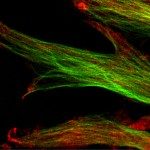Lien vers Pubmed [PMID] – 17586819
Nucleic Acids Res. 2007;35(13):4552-61
Oligoribonuclease is the only RNase in Escherichia coli that is able to degrade RNA oligonucleotides five residues and shorter in length. Firmicutes including Bacillus subtilis do not have an Oligoribonuclease (Orn) homologous protein and it is not yet understood which proteins accomplish the equivalent function in these organisms. We had previously identified oligoribonucleases Orn from E. coli and its human homolog Sfn in a screen for proteins that are regulated by 3′-phosphoadenosine 5′-phosphate (pAp). Here, we identify YtqI as a potential functional analog of Orn through its interaction with pAp. YtqI degrades RNA oligonucleotides in vitro with preference for 3-mers. In addition, YtqI has pAp-phosphatase activity in vitro. In agreement with these data, YtqI is able to complement both orn and cysQ mutants in E. coli. An ytqI mutant in B. subtilis shows impairment of growth in the absence of cysteine, a phenotype resembling that of a cysQ mutant in E. coli. Phylogenetic distribution of YtqI, Orn and CysQ supports bifunctionality of YtqI.

